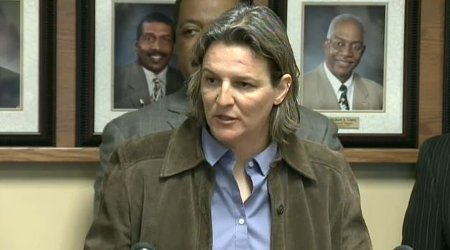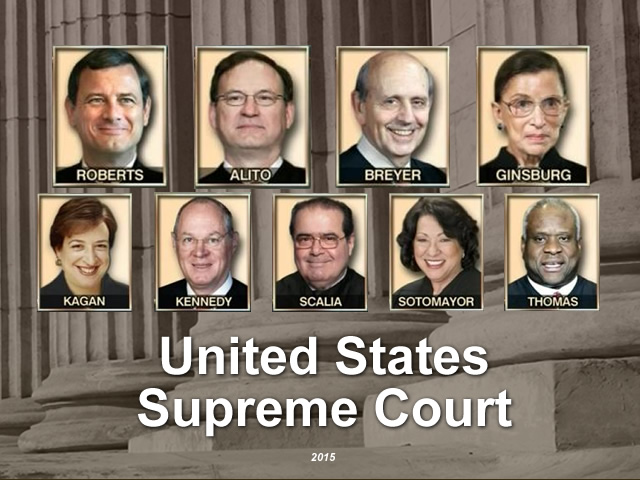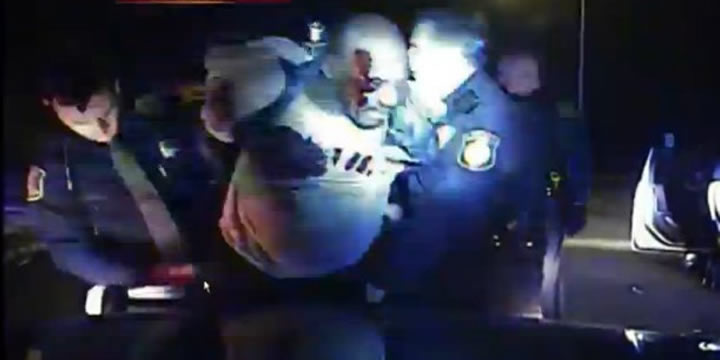
Jun 15, 2015 | News
Judge disqualifies all 250 prosecutors because of widespread corruption
Orange County, California. With more than 3 million residents, it’s larger than 21 states. If Orange County were a separate country, its economy would be the 45th largest in the world.
Now known for Disneyland, the county may soon be known for having one of the most corrupt justice systems in the world. The width and depth and duration of the corruption truly boggles the mind. A case that should’ve been open and shut has blown the lid off some deep secrets.
On October 12, 2011, Orange County experienced the deadliest mass killing in its modern history.
Scott Dekraai killed 8 people, including his ex-wife, in a Seal Beach beauty salon. He was arrested wearing full body armor just a few blocks away. Without a doubt, Dekraai was the perpetrator. A dozen surviving witnesses saw him. He admitted to the shooting early on.
Yet, nearly four years later, the case against him has all but fallen apart.
It turns out that prosecutors and police officers committed an egregious violation of Dekraai’s rights—so much so that Superior Court Judge Thomas Goethals shocked everyone and removed the Orange County District Attorney’s Office, and all 250 prosecutors, from having anything more to do with the case.
It turns out that Orange County has a secret system of evidence manufacturing and storage that they have used in countless cases, and the collusion is unraveling dozens of cases and may soon unravel the careers of countless prosecutors and law enforcement officers who’ve maintained it for decades. It’s called TRED.
For a quarter of a century, OCSD management deemed TRED beyond the reach of any outside authority. In Dekraai, deputies Ben Garcia and Seth Tunstall committed perjury to hide the mere existence of TRED. Those lies didn’t originate from blind loyalty, however. The concealed records show how prosecution teams slyly trampled the constitutional rights of defendants by employing informants—and then keeping clueless judges, juries and defense lawyers.
Now, prosecutors in Orange County are unethically steering cases away from Judge Thomas Goethals, who kicked them off the case in the Seal Beach murders and has been persistent about their violations in other cases.
Since February 2014, the district attorney’s office has asked to disqualify Goethals—a former homicide prosecutor and defense attorney—in 57 cases, according to court records.
In 2011, records show, prosecutors made disqualification requests against Goethals just three times. In 2012, zero times. In 2013, only twice.
So egregious are the violations that the Public Defenders Office filed this 500+ page motion detailing instance after instance of cases where men and women have had their essential rights violated.
“Not a single prosecutor or officer has been held accountable for the illegal and unethical conduct that has taken place”
These violations are beginning to cause cases all over the county to crumble.
How deep will this rabbit hole go and who will fight against the truth coming out to protect their careers?
May 29, 2015 11:26am PDT by Shaun King
California – Go figure…Read More Here

Jun 1, 2015 | Blog, Criminal Defense Attorney Michael Komorn
Everyday, I get calls to my office from medical marijuana patients and caregivers who have been raided or pulled over by police. Often times, these individuals are not arrested, and little if any paperwork is left behind by the various Narcotics Enforcement Teams.
Not only will these agencies leave little to no paperwork, but they’ll leave you with much less than what you owned prior to their visit. Everything from cars, laptops, grow equipment, cell phones, even family heir-looms; If there is marijuana in your house or car, there’s a good chance that the police will seize your personal property.
In fact, the police can seize what they want without charging you with a crime. Such was the case with Tarik Dehko, a grocer from Flint, Michigan. When he went to check his bank account, he instantly thought he had been the victim of fraud, as all of his $35,000 had been taken. When he contacted his bank, the answer he got was much worse: the Federal Government had seized all of his money out of his business account, simply because they didn’t like the way he was making deposits. Tarik had never been notified, and has not been charged with a crime, yet the federal government was permitted to take his money.
Anyone at all familiar with the forfeiture process knows that the police use it as a way to generate revenue for their own department by making the owner do buy backs, or selling the items at auction. Today’s forfeiture laws are cash cows for police, and it is not surprising that we see police driving fancier cars, motorcycles, or even horses. They are armed more like army rangers than civilian law enforcers, and open new departments or acquire SWAT teams with all the surplus money generated through this process.
But there is a light at the end of the tunnel. I have been able to successfully reacquire the items seized from many of my clients without them having to pay the police agencies who stole them. Before you cut a big check to your local sheriffs department, contact Komorn Law and get what is rightfully yours returned to you.
Related: Pardons for Medical Marijuana Patients in Nevada?
Michael Komorn is recognized as a leading expert on the Michigan Medical Marihuana Act. He is the President of the Michigan Medical Marijuana Association (MMMA), a nonprofit patient advocacy group with over 26,000 members, which advocates for medical marijuana patients, and caregiver rights. Michael is also the host of Planet Green Trees Radio, a marijuana reform based show, which is broadcast every Thursday night 8-10 pm EST. Follow Komorn on Twitter.

Apr 27, 2015 | Blog, News, Uncategorized
Where The Rubber Meets The Road…
The Supreme Court ruled 6-3 on Tuesday April 21, 2015 that the Constitution forbids police from holding a suspect without probable cause, even for fewer than 10 extra minutes.
Writing on behalf of the court, Justice Ruth Bader Ginsburg declared that the constitutional protections against unreasonable search and seizure prevent police from extending an otherwise completed traffic stop to allow for a drug-sniffing dog to arrive.
“We hold that a police stop exceeding the time needed to handle the matter for which the stop was made violates the Constitution’s shield against unreasonable seizures.”
The Rodriguez cases is important in the ongoing line being drawn between citizens living in a democracy based upon freedom and the governments interest of protecting the safety and wellbeing of the public. All too often we get calls involving police encounters during a traffic stop. Traffic stops in certain situations can and will lead to searches of vehicles, depending on many factors. Prior to the Rodriguez case, the bright line rule had been that the traffic stop may extend only as long as it was necessary for the reason for the traffic stop to be completed ( writing a ticket, giving a warning etc..). The purpose of a traffic stop is not and should never be to investigate a person unless there is some suspicion of a crime afoot. Sometime in traffic situation, and because drivers are unaware of their legal obligation during a traffic stop, often times the police can and will take advantage of these situations, detain the driver longer than they need to be detain, and utilize that time to try to find probable cause of some crime.
Rodriguez v the United States puts an end to that type of police work. After the traffic stop had been complete with Rodriguez, the Nebraska Trooper asked if he could walk his drug sniffing, k-9 around the vehicle. To his credit, Rodriguez stated no, the trooper nonetheless searched the exterior of the vehicle for 7-8 minutes while awaiting back up to arrive. After the k-9 allegedly hit on the vehicle, a search of the vehicle revealed large quantities of methamphetamine, and Rodriguez was arrested and charged. It is important to note that the entirety of the traffic stop lasted less than 30 minutes.
In suppressing all the evidence (the methamphetamine) that was a result of the traffic stop and search of the vehicle, the United States Supreme Court found that search of Rodriguez’s car was illegal, and the evidence gathered in it should not be used at trial. While officers may use a dog to sniff around a car during the course of a routine traffic stop, they cannot extend the length of the stop in order to carry it out.
“[T]he tolerable duration of police inquiries in the traffic-stop context is determined by the seizure’s ‘mission’ — to address the traffic violation that warranted the stop,” Ginsburg ruled. “Authority for the seizure thus ends when tasks tied to the traffic infraction are — or reasonably should have been — completed.”
In its dissenting opinion Justices Clarence Thomas (writing for the dissent), Samuel Alito and Anthony Kennedy disagreed with the ruling, taunting the majority opinion by stating “Had Officer Struble arrested, handcuffed, and taken Rodriguez to the police station for his traffic violation, he would have complied with the Fourth Amendment. “But because he made Rodriguez wait for seven or eight extra minutes until a dog arrived, he evidently committed a constitutional violation. Such a view of the Fourth Amendment makes little sense.” Justice Thomas argued the majorities ruling makes meaningless the legal difference between “reasonable suspicion”- which does not authorize a search of someone’s property and “probable cause” which does and arguing that police can reasonably detain people to investigate other possible violations of the law.
Read the decision here
Rodriguez-v-United-States-USSC-2015.pdf
Rodriguez v United States – USSC-2015 Petition Brief.pdf

Mar 29, 2015 | Blog
March 25, 2015
Here we go again…
Watch the videos at the bottom…
According to reports in the Detroit Free Press and Channel 4 News. On January 28, a police dash cam captured an incident involving the police and another human…being… beaten into submission. The activities took place in Inkster, Michigan.
According to reports the police officers began following the vehicle that night after seeing it stop at the Motown Inn, an area they claim has high drug trafficking. The driver later identified as Floyd Dent, who worked for Ford for 37 years with no criminal record says he stopped to visit a friend on the way home and took the friend a bottle of alcohol.
After pulling him over the two officers approached with their guns drawn. As Dent opened the door, they pulled him out and shoved him to the ground.
Dent did not appear in the video to be resisting arrest.
While on the ground, a police officer later identified as William Melendez had him in a choke hold, and was repeatedly punching him in the face and head while another officer is attempted to handcuff him…but Dent had his right arm up, trying to protect his face and head against Melendez. Another officer arrived and kicked him, and then for good measures another officer allegedly tasers Dent as he is handcuffed. Dent said he was hospitalized for two days for the injuries.
Police initially charged him with assault, resisting arrest, and possession of cocaine, insisting they found cocaine beneath the passenger seat of his Cadillac. Dent says police planted the drugs at the time of his arrest. Dent said a blood test revealed he didn’t have any drugs in his system.
An Inkster district court judge, after reviewing the tape, tossed the assault and resisting charges, but Dent faces an April 1 hearing on the drug charge.
But his attorney, Gregory Rohl, said that a close review of portions of the video show police planting the drugs.
The video appears to contradict official police reports of the incident.
According to police reports, Dent, who had a suspended license, ran a stop sign and they turn on their overhead lights, but he drove a few more blocks before he pulled over. Dent opened the driver’s door, then turned his body toward the interior of the car and appeared to be reaching for something in the console. The police said they demanded to see his hands, but he just turned to them with a “blank stare as if on a form of narcotic” and then said, “I’ll kill you.”
But the video shows the police officers walking up to the open door, then one immediately shoving the gun at Dent, then dragging him out onto the pavement. There is no audio. Not one of the many officers there was equipped with a microphone – or turned one on..
Dent says the police officer yelled, “Get out of the car! I’ll blow your head off!”
The police officer doing the choking claims Dent was biting him, although in police reports he acknowledges there were no bite marks and says that was due to several layers of clothing he was wearing.
One of the officers involved, William Melendez, has been accused of misconduct before, during his time with the Detroit Police Department. In 2004, Melendez was among eight Detroit Police officers acquitted in a federal trial for civil rights abuses, including planting evidence on criminal suspects. Hmmm…
Dent is still facing possession of cocaine charges. He was offered a plea deal that included probation and expunging his record after six months, but he turned it down. He said he won’t plead guilty to something he didn’t do.
Would you take that? If it all wasn’t caught on video he would be facing much more, paying all the costs, fines, fees, jail time, probation, driver responsibilty fees, license suspension, reinstatement fees, lawyer fees, victim restitution fees, etc…
Save your judgement till the facts are all in…The Michigan State Police are investigating the incident.
Inkster Police Beating An Alleged Suspect On The Ground
Alleged Suspect – Back Of Car

Mar 29, 2015 | Blog, News
3/28/15
Be sure to read the related articles and watch channel 4 video below
The Inkster police officer (William Melendez) shown beating a motorist following a traffic stop has been involved in 12 lawsuits related to his conduct as an officer over the years, including similar allegations in a civil rights suit now pending in federal court.
According to a Detroit Free Press report…
William Melendez assaulted Deshawn Acklin in a home in Inkster during a drug investigation, according the 2013 lawsuit filed in U.S. District Court in Detroit. As Acklin lay handcuffed face down on the floor, Melendez “began to choke him and beat him until he was unconscious,” and defecated in his pants, according to the suit. Melendez would later claim that Acklin resisted arrest and he was forced to subdue him. Acklin, who was hospitalized for his injuries, was never charged with a crime, even though Inkster police kept him in custody for three days, according to the suit.
Photos in the court file show Acklin with “serious injuries to his head and face.” Acklin was never charged with a crime.
Melendez, a former Detroit police officer, is currently at the center of an investigation into the Jan. 28 beating of motorist Floyd Dent, 57, who was shown being dragged from his 2011 Cadillac, choked and pummeled by Melendez, then Tasered and kicked by other Inkster officers.
Thursday, Inkster Police Chief Vicki Yost said an independent investigation by Michigan State Police is under way.

Vicki Yost
The Acklin case is among 12 federal lawsuits filed against Melendez dating to 1996, alleging, among other things, that he planted evidence, assaulted people in their homes, fabricated police reports, and wrongly arrested people. Some of the suits were dropped, and some settled out of court. In one case, the city of Detroit paid $50,000 to the family of a man shot to death in his kitchen. The suit alleges Melendez — then a Detroit police officer — was involved in the killing.
Melendez also was among eight Detroit police officers indicted by a federal grand jury in 2003 on civil rights violations, charged with fabricating evidence, planting guns and drugs, lying and assaulting people. Federal investigators at the time said Melendez was known on the street as “Robocop.” The officers were acquitted in 2004. Melendez resigned from the Detroit force in September 2007. It is not clear when he joined Inkster.
Last week, U.S. District Judge Gershwin Drain refused to throw out the case against Melendez and several other Inkster officers, noting that there was “sufficient evidence that Melendez’s purported actions were objectively unreasonable in light of Acklin’s clearly established constitutional rights.”
Former Police Chief Hilton Napoleon, who resigned last summer after a 31/2-year tenure that included internal strife and two officers’ union votes of no confidence, told the Free Press on Thursday that he’d known officers who would lie under oath.
“I’ve had complaints of Inkster officers taking money off of people and planting drugs,” he said.
“You have officers there that have questionable integrity, and they should not be wearing the badge, and they should not be out there policing people,” Napoleon said, as he’d also said during his time as chief. “You can’t change a person’s heart. And you can’t make a person do the right thing and be moral.”
Napoleon, who is the brother of Wayne County Sheriff Benny Napoleon, said union and administrative bureaucracy made it difficult to fire officers during his short time there.
Unlike some other organizations who have become judge and jury. It is suggested you wait till the investigation is complete then decide personal judgment. It’s also understood…politicians, judges, cops, prosecutors and everyone on the planet lies at some point in their life. Some more than others and most in self preservation scenarios, self glorification and… career boosting… of course.
https://www.youtube.com/watch?feature=player_embedded&v=TiLa24PdiKY
Related Material
21050326 Inkster Police Beating 02 Free Press
20030620 Robocop-Melendez-Freep
20040415 Michigan Citizen – Detroit Killer Cops
20040228 Feds-break-blue-wall-Melendezl
20000520 Wayne County Prosecution Threatens Jail to Witnesses
Inkster cop -Melendez-lawsuit-listings
260124740-Federal-Court-Decision-against-William-Bill-Robocop-Melendez-in-the-brutality-case-with-Plaintiff-Deshawn-Acklin





